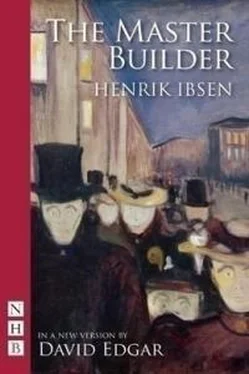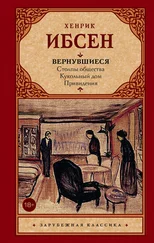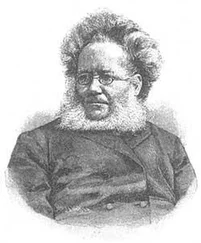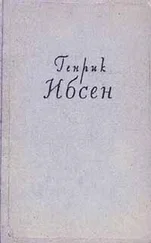On the whole, then, it cannot be doubted that several symbolic motives are inwoven into the iridescent fabric of the play. But it is a great mistake to regard it as essentially and inseparably a piece of symbolism. Essentially it is a history of a sickly conscience, worked out in terms of pure psychology. Or rather, it is a study of a sickly and a robust conscience side by side. "The conscience is very conservative," Ibsen has somewhere said; and here Solness's conservatism is contrasted with Hilda's radicalism—or rather would–be radicalism, for we are led to suspect, towards the close, that the radical too is a conservative in spite or herself. The fact that Solness cannot climb as high as he builds implies, I take it, that he cannot act as freely as he thinks, or as Hilda would goad him into thinking. At such an altitude his conscience would turn dizzy, and life would become impossible to him. But here I am straying back to the interpretation of symbols. My present purpose is to insist that there is nothing in the play which has no meaning on the natural–psychological plane, and absolutely requires a symbolic interpretation to make it comprehensible. The symbols are harmonic undertones; the psychological melody is clear and consistent without any reference to them. [4] This conception I have worked out at much greater length in an essay entitled The Melody of the Master Builder , appended to the shilling edition of the play, published in 1893. I there retell the story, transplanting it to England and making the hero a journalist instead of an architect, in order to show that (if we grant the reality of certain commonly–accepted phenomena of hypnotism) there is nothing incredible or even extravagantly improbable about it. The argument is far too long to be included here, but the reader who is interested in the subject may find it worth referring to.
It is true that, in order to accept the action on what we may call the realistic level, we must suppose Solness to possess and to exercise, sometimes unconsciously, a considerable measure of hypnotic power. But time is surely past when we could reckon hypnotism among "supernatural" phenomena. Whether the particular forms of hypnotic influence attributed to Solness do actually exist is a question we need not determine. The poet does not demand our absolute credence, as though he were giving evidence in the witness–box. What he requires is our imaginative acceptance of certain incidents which he purposely leaves hovering on the border between the natural and the preternatural, the explained and the unexplained. In this play, as in The Lady from the Sea and Little Eyolf , he shows a delicacy of art in his dalliance with the occult which irresistibly recalls the exquisite genius of Nathaniel Hawthorne. [5] For an instance of the technical methods by which he suggested the supernormal element in the atmosphere of the play, see Introduction to A Doll's House , p. xiv.
The critics who insist on finding nothing but symbolism in the play have fastened on Mrs. Solness's "nine lovely dolls," and provided the most amazing interpretations for them. A letter which I contributed in 1893 to the Westminster Gazette records an incident which throws a curious light on the subject and may be worth preserving. "At a recent first night," I wrote, "I happened to be seated just behind a well–known critic. He turned round to me and said, 'I want you to tell me what is YOUR theory of those "nine lovely dolls." Of course one can see that they are entirely symbolical.' 'I am not so sure of that,' I replied, remembering a Norwegian cousin of my own who treasured a favourite doll until she was nearer thirty than twenty. 'They of course symbolise the unsatisfied passion of motherhood in Mrs. Solness's heart, but I have very little doubt that Ibsen makes use of this "symbol" because he has observed a similar case, or cases, in real life.' 'What!' cried the critic. 'He has seen a grown–up, a middle–aged woman continuing to "live with" her dolls!' I was about to say that it did not seem to me so very improbable, when a lady who was seated next me, a total stranger to both of us, leant forward and said, 'Excuse my interrupting you, but it may perhaps interest you to know that I HAVE THREE DOLLS TO WHICH I AM DEEPLY ATTACHED!' I will not be so rude as to conjecture this lady's age, but we may be sure that a very young woman would not have had the courage to make such an avowal. Does it not seem that Ibsen knows a thing or two about human nature—English as well as Norwegian—which we dramatic critics, though bound by our calling to be subtle psychologists, have not yet fathomed?" In the course of the correspondence which followed, one very apposite anecdote was quoted from an American paper, the Argonaut : "An old Virginia lady said to a friend, on finding a treasured old cup cracked by a careless maid, 'I know of nothing to compare with the affliction of losing a handsome piece of old china.' 'Surely,' said the friend, 'it is not so bad as losing one's children.' 'Yes, it is,' replied the old lady, 'for when your children die, you do have the consolations of religion, you know.'"
It would be a paradox to call The Master Builder Ibsen's greatest work, but one of his three or four greatest it assuredly is. Of all his writings, it is probably the most original, the most individual, the most unlike any other drama by any other writer. The form of Brand and Peer Gynt was doubtless suggested by other dramatic poems—notably by Faust . In The Wild Duck , in Rosmersholm , in Hedda Gabler , even in Little Eyolf and John Gabriel Borkman , there remain faint traces of the French leaven which is so strong in the earlier plays. But The Master Builder had no model and has no parallel. It shows no slightest vestige of outside influence. It is Ibsen, and nothing but Ibsen.
W.A.
HALVARD SOLNESS, Master Builder.
ALINE SOLNESS, his wife.
DOCTOR HERDAL, physician.
KNUT BROVIK, formerly an architect, now in SOLNESS'S employment.
RAGNAR BROVIK, his son, draughtsman.
KAIA BROVIK, his niece, book–keeper.
MISS HILDA WANGEL.
Some Ladies.
A Crowd in the street.
The action passes in and about SOLNESS'S house.
A Plainly-furnished Work-room in the House of Halvard Solness. Folding Doors on the Left Lead Out to the Hall. on the Right is the Door Leading to the Inner Rooms of the House. at the Back is an Open Door Into the Draughtsmen's Office. in Front, on the Left, a Desk With Books, Papers and Writing Materials. Further Back Than the Folding Door, a Stove. in the Right- Hand Corner, a Sofa, a Table, and One or Two Chairs. on the Table a Water-bottle and Glass. a Smaller Table, With a Rocking-chair and Arm-chair, in Front on the Right. Lighted Lamps, With Shades, on the Table in the Draughtmen's Office, on the Table in the Corner, and on the Desk - In the Draughtsmen's Office Sit Knut Brovik and His Son Ragnar, Occupied With Plans and Calculations. at the Desk in the Outer Office Stands Kaia Fosli, Writing in the Ledger. Knut Brovick is a Spare Old Man With White Hair and Beard. He Wears a Rather Threadbare but Well-brushed Black Coat, With Spectacles, and a Somewhat Discoloured White Neckcloth. Ragnar Brovik is a Well-dressed, Light-haired Man in His Thirties, With a Slight Stoop. Kaia Fosli is a Slightly Built Girl, a Little Over Twenty, Carefully Dressed, and Delicate-looking. She Has a Green Shade Over Her Eyes.--all Three Go on Working for Some Time in Silence
KNUT BROVIK.
[Rises suddenly, as if in distress, from the table; breathes heavily and laboriously as he comes forward into the doorway.] No, I can't bear it much longer!
Читать дальше









